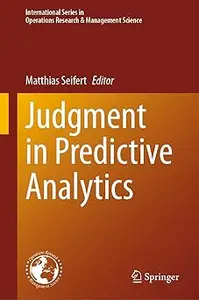
Free Download Matthias Seifert, "Judgment in Predictive Analytics "
English | ISBN: 303130084X | 2023 | 327 pages | EPUB | 10 MB
This book highlights research on the behavioral biases affecting judgmental accuracy in judgmental forecasting and showcases the state-of-the-art in judgment-based predictive analytics. In recent years, technological advancements have made it possible to use predictive analytics to exploit highly complex (big) data resources. Consequently, modern forecasting methodologies are based on sophisticated algorithms from the domain of machine learning and deep learning. However, research shows that in the majority of industry contexts, human judgment remains an indispensable component of the managerial forecasting process. This book discusses ways in which decision-makers can address human behavioral issues in judgmental forecasting.
The book begins by introducing readers to the notion of human-machine interactions. This includes a look at the necessity of managerial judgment in situations where organizations commonly have algorithmic decision support models at their disposal.The remainder of the book is divided into three parts, with Part I focusing on the role of individual-level judgment in the design and utilization of algorithmic models. The respective chapters cover individual-level biases such as algorithm aversion, model selection criteria, model-judgment aggregation issues and implications for behavioral change. In turn, Part II addresses the role of collective judgments in predictive analytics. The chapters focus on issues related to talent spotting, performance-weighted aggregation, and the wisdom of timely crowds. Part III concludes the book by shedding light on the importance of contextual factors as critical determinants of forecasting performance. Its chapters discuss the usefulness of scenario analysis, the role of external factors in time series forecasting and introduce the idea of mindful organizing as an approach to creating more sustainable forecasting practices in organizations.
Read more
Recommend Download Link Hight Speed | Please Say Thanks Keep Topic Live
Links are Interchangeable - Single Extraction
